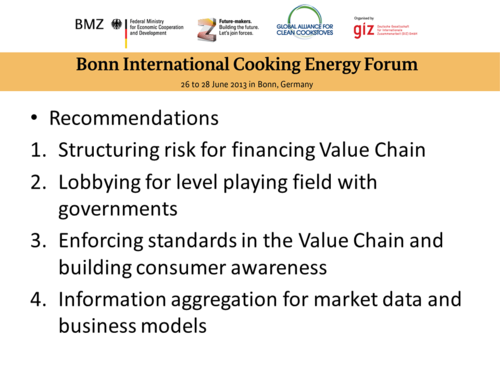Going to Scale - How Private and Public Sector can Join Forces to Create Vibrant Markets for Cookstoves Focusing on Global/Multi-national Production - Workshop 2.2 Recommendations Bonn 2013
Workshop 2.2: Going to Scale - How Private and Public Sector can Join Forces to Create Vibrant Markets for Cookstoves Focusing on Global/Multi-national Production
- Facilitator/Chair: Jeroen Blum, Shell Foundation
- Rapporteur: Heba Rabie, The Gold Standard Foundation
Key Areas Discussed
1. The main challenges and achievements that the audience experienced in developing and distributing cookstoves on an international level
a. Achievements- securing funding from donors to develop production in host countries such as Kenya (Burn), and reaching high levels of distribution globally, reaching end-users efficiently.
b. Challenges- transport, R&D, moving from growth phase to the roll-out, partnering with small local organizations that do not have access to finance, consumer habits feeding back into the issue research.
2. Finance- where to access finance and how to make working capital available.
3. Recommendations to the Global Alliance on the bigger role they can play through lobbying with governments of donor and host countries alike. Issues such as tariffs, public awareness and funding should be discussed.
Recommendations
1. Where to look for funding for project design of cookstoves? Sources for R&D that can be made use of by entire cookstove community. Make sure that public funding and private funding works together towards a common goal.
2. Combine sources of funding: donor, private, and carbon funding.
3. Lobbying with government to adjust import tariffs.
4. Government to provide data online, and the market should clarify what type of data is needed.
5. Government should invest in R&D.
6. In order for the market to be sustainable, we should eventually move away from grants.
7. Public Awareness- making sure that the public are aware of the importance of the product.
Specific Action Proposed (Including Responsibilities)
Proposed future role of GACC and GIZ:
1. Combining financing efforts, with a focus on working capital
2. Lobbying with governments,
3. Enforcing standards and protocols, ensuring that there is consumer awareness of these standards.
4. Consolidating data about business plans and making it available to project developers.




















